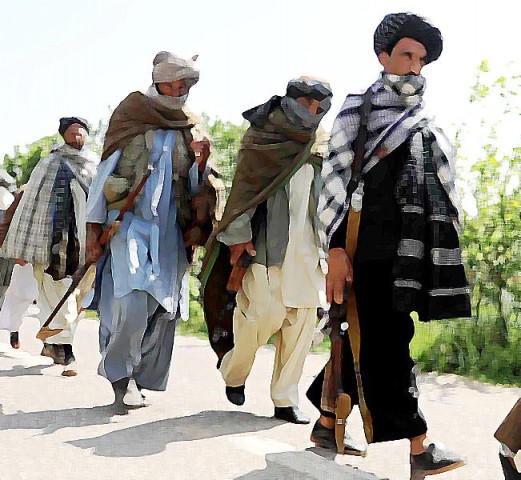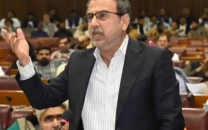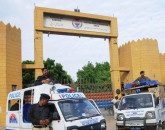Pakistan, Afghanistan extend olive branch to Taliban
Eight Taliban prisoners released in response to Afghan govt request.

In a significant breakthrough in stalled peace negotiations, Pakistan and Afghanistan on Wednesday launched a joint appeal asking the Taliban and other insurgent groups to disarm and enter peace talks aimed at peacefully ending the lingering conflict in Afghanistan.
A joint statement issued at the conclusion of an extended trip by top Afghan negotiator Salahuddin Rabbani also called on the Taliban to sever all links with al Qaeda and other international terrorist organisations.
The statement went on to say that all concerned countries, including Pakistan, Afghanistan and the United States, will facilitate safe passage to potential negotiators to advance the reconciliation process.
The development indicates that Washington was taken into confidence before the two neighbours announced these measures, which may break the stalemate in an otherwise fragile peace process.
According to the official announcement, Pakistan and Afghanistan will work closely with other international partners to remove the names of potential negotiators, affiliated with the Taliban and other factions of the group, from the UN sanctions list to enable them to participate in peace talks.
Release of Taliban prisoners
“In support of peace and reconciliation process and in response to the requests of the Afghan government, a number of Taliban detainees are being released,” it added.
Even though the names and the exact number of those Taliban prisoners have not been made public, a senior security official confirmed to The Express Tribune that up to eight Taliban leaders were released on Wednesday. The official, however, added that Mullah Abdul Ghani Baradar, the former No 2 in the Taliban hierarchy, was not on the list of those who were freed.
The announcement, nevertheless, appears to be the first tangible outcome of extensive discussions between the two countries to end the stalemate in the Afghan reconciliation process. Afghan officials were hopeful that direct contact with Taliban commanders could give them leverage in any peace talks. It is unclear, though, whether the move could lead to any peace deal. Some observers describe the development as a sign of clear frustration on part of the major stakeholders to bring the decade-long war to its logical end.
One Pakistani official, who was part of the discussion process, claimed that Islamabad’s view had been vindicated that only use of force would not bring peace and stability in Afghanistan.
“The answer to the current Afghan impasse is meaningful and all-inclusive reconciliation process,” the official added.
He said the joint appeal was meant to convey a strong message to the Taliban that Afghanistan and other players were sincere in their efforts to seek a negotiated settlement of the conflict. “They called for long term and consistent mutual cooperation based on mutual interest and respect,” the official said. According to the joint statement, the two neighbours agreed that government officials from both sides will refrain from making hostile statements and avoid blame game.
To initiate an effective mechanism to facilitate consistent and practical steps, Pakistan’s foreign ministry and the Afghan High Peace Council agreed to have more frequent contacts to enhance peace and stability in Afghanistan and the region.
“Striking a balance”
While the two sides offered an olive branch to the Taliban, they attempted to build public opinion against the insurgents’ ideology by agreeing to hold a conference of religious scholars from Pakistan, Afghanistan and other Islamic countries.
Published in The Express Tribune, November 15th, 2012.


















COMMENTS
Comments are moderated and generally will be posted if they are on-topic and not abusive.
For more information, please see our Comments FAQ